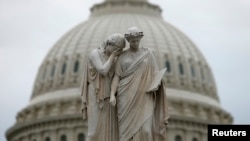The U.S. says it would not immediately run out of cash if Congress fails to increase the country's $16.7 trillion borrowing limit to avoid a default, but would within days.
Unless Congress acts Wednesday to increase the debt ceiling, the government will run out of borrowing authority on Thursday to raise more money to pay its bills, including interest on U.S. securities held by China, Japan and other overseas investors.
The government says it has about $30 billion on hand, and some money routinely coming into the Treasury on a regular basis, to pay its bills for a few days. But financial analyst Steve Bell of the Washington-based Bipartisan Policy Center told VOA that absent new borrowing authority, the government could run out of cash by next week.
"Sometime between Thursday and probably next week sometime, they're going to not have enough cash on hand to actually pay all the bills we have that come in on a daily basis," he said.
In the next two weeks, the government has several major bills coming due, billions of dollars it owes to investors who have bought U.S. government bonds and monthly government pensions to older Americans. The government has not said what day it expects to run out of cash, but the Congressional Budget Office says it could be next Tuesday.
Some critics of government spending practices, chiefly Republican opponents of U.S. President Barack Obama, a Democrat, say the government could continue making interest payments on securities held by investors so the country technically would not default.
But analysts like Bell say that if the country misses payments on any of its bills it would be defaulting. The U.S. has had small-scale technical defaults in the past, but Bell says the intent of a default this time would be unprecedented.
"This would be the first time the United States has just said as a matter of policy, we're not going to pay our bills," he said.
He said the government, rather than trying to prioritize which bills to pay, such as those owed to overseas investors or U.S. pensioners, is more likely to delay, day by day, paying bills until it has enough cash on hand to make all the payments it should have made days earlier. But that, he says, can only last for a short time and payment of bills would be increasingly delayed.
Leaders in the U.S. Senate are attempting to negotiate a settlement of the Washington financial impasse, to increase the debt cap and end the 16-day partial government shutdown.
But such a fix would also have to be approved by the fractious House of Representatives, where a conservative minority has blocked efforts to end the stalemate while demanding changes to Obama's health care reforms, his signature legislative achievement.
Unless Congress acts Wednesday to increase the debt ceiling, the government will run out of borrowing authority on Thursday to raise more money to pay its bills, including interest on U.S. securities held by China, Japan and other overseas investors.
The government says it has about $30 billion on hand, and some money routinely coming into the Treasury on a regular basis, to pay its bills for a few days. But financial analyst Steve Bell of the Washington-based Bipartisan Policy Center told VOA that absent new borrowing authority, the government could run out of cash by next week.
"Sometime between Thursday and probably next week sometime, they're going to not have enough cash on hand to actually pay all the bills we have that come in on a daily basis," he said.
In the next two weeks, the government has several major bills coming due, billions of dollars it owes to investors who have bought U.S. government bonds and monthly government pensions to older Americans. The government has not said what day it expects to run out of cash, but the Congressional Budget Office says it could be next Tuesday.
Some critics of government spending practices, chiefly Republican opponents of U.S. President Barack Obama, a Democrat, say the government could continue making interest payments on securities held by investors so the country technically would not default.
But analysts like Bell say that if the country misses payments on any of its bills it would be defaulting. The U.S. has had small-scale technical defaults in the past, but Bell says the intent of a default this time would be unprecedented.
"This would be the first time the United States has just said as a matter of policy, we're not going to pay our bills," he said.
He said the government, rather than trying to prioritize which bills to pay, such as those owed to overseas investors or U.S. pensioners, is more likely to delay, day by day, paying bills until it has enough cash on hand to make all the payments it should have made days earlier. But that, he says, can only last for a short time and payment of bills would be increasingly delayed.
Leaders in the U.S. Senate are attempting to negotiate a settlement of the Washington financial impasse, to increase the debt cap and end the 16-day partial government shutdown.
But such a fix would also have to be approved by the fractious House of Representatives, where a conservative minority has blocked efforts to end the stalemate while demanding changes to Obama's health care reforms, his signature legislative achievement.








